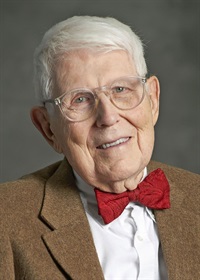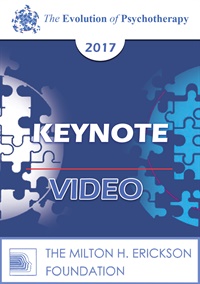EP17 Keynote 07 - New Breakthroughs in Cognitive Therapy: Applications to the Severely Mentally Ill - Aaron Beck, MD and Judith Beck, PhD
Credit Available - See Credits tab below.
Total Credits: 1 including 1 A.P.A.
- Average Rating:
- Not yet rated
- Topic Areas:
- Keynotes | Cognitive Behavior Therapy (CBT) | Psychotherapy
- Bundle(s):
- Learning Track - EP17 CBT Stream
- Categories:
- Evolution of Psychotherapy | Evolution of Psychotherapy 2017 | Evolution of Psychotherapy CBT Learning Track | Online Continuing Education
- Faculty:
- Aaron Beck, MD | Judith Beck, PhD
- Course Levels:
- Master Degree or Higher in Health-Related Field
- Duration:
- 56:33
- Format:
- Audio and Video
- Original Program Date:
- Dec 16, 2017
- License:
- Never Expires.
Description
Description: A deeply human look at cognitive therapy with people diagnosed with schizophrenia and other severe mental illnesses. Participants learn how recovery-oriented cognitive therapy builds engagement through relationship, shared activity, and attention to personal aspirations rather than symptom confrontation. Through vivid clinical examples, the session shows how delusions, withdrawal, and hopelessness can soften when therapy centers dignity, meaning, and real-world connection, alongside medication when appropriate.
Syllabus Description: According to a recent survey, Cognitive Therapy is now the leading form of psychotherapy throughout the world. Its application to the numerous psychological disorders, as well as medical problems, has been well documented. In recent years, Cognitive Therapy has been successfully applied to the most intractable and chronic disorders, such as severe mental illness. Strategies and techniques in treating schizophrenia will be described.
Educational Objectives:
- Demonstrate a new understanding of cognitive therapy (CBT) and its applications.
- Describe the application of CBT to severe mental illness.
*Sessions may be edited for content and to preserve confidentiality*
Credits
1 credits available.
The Milton H. Erickson Foundation, Inc. is approved by the American Psychological Association to sponsor continuing education for psychologists. The Milton H. Erickson Foundation, Inc. maintains responsibility for this program and its content.
THE MILTON H. ERICKSON FOUNDATION Policy on Disclosure
The Milton H. Erickson Foundation is proud of the conferences and other
educational opportunities it sponsors, taking care that the conduct of
these activities conforms to the standards and principles of behavioral
and medical sciences, thus ensuring balance, independence, objectivity
and scientific rigor in all individually sponsored or jointly sponsored educational
activities.
All faculty members participating in a sponsored activity, and those who
review and therefore are in control of content, are requested to disclose
any relevant financial relationship prior to the CME activity, including but
not limited to specific commercial interests, financial remuneration received
by faculty member or spouse, and what role or activity was performed
for this remuneration. If a conflict of interest exists as a result of
a financial relationship it will be resolved prior to the activity. A faculty
member will not be allowed to present if the conflict is not or cannot be
resolved.
Faculty

Aaron Beck, MD Related Seminars and Products
Dr. Aaron T. Beck, M.D. is University Professor of Psychiatry (Emeritus) in the Department of Psychiatry, Perelman School of Medicine at the University of Pennsylvania and director of the Aaron T. Beck Psychopathology Research Center. Based on his research on the psychological processes involved in depression and other disorders, he developed and tested Cognitive Therapy (also known as Cognitive Behavior Therapy), the most widely used form of psychotherapy in the world. He has personally trained large numbers of professionals in this specialized approach and helped to form centers for Cognitive Therapy throughout the world, devoted to both research and serving countless numbers of patients. Starting in 2007, he has directed the Beck Initiative partnership in collaboration with Arthur Evans, former Commissioner of Mental Health of Philadelphia, serving the Medicaid patients in the city. He and his group have been training providers, offering services to the most disadvantaged individuals in the city and state: severely mentally ill individuals confined to hospitals and jails, and also the homeless.
For several decades, Beck conducted research on the psychological and social factors involved in schizophrenia and developed a humanistic approach involved in activating the individual’s latent goals, motivations, and capacities, and has helped to restore large numbers to meaningful lives. His innovative approach in Philadelphia and Pennsylvania has now been extended to other states such as Georgia, Massachusetts, New Jersey, and Utah. In collaboration with the National Association of State Commissioners of Mental Health, he and his Center have started to disseminate his approach throughout the country. In addition, he and his team are working with Gary Gottlieb, Chief Executive Officer of Partners in Health to adapt cognitive therapy to the needs of individuals in 27 developing countries.
Beck has described his work extensively in 637 publications, including 24 books. He has been named by Medscape as one of the 50 Most Influential Physicians in History: 20th on the list and 1st among the living. He has received the 2006 Albert Lasker Award for Clinical Medical Research, which “transformed the understanding and treatment” of mentally ill individuals, the 2006 National Academy of Medicine: Lienhard Award for the advancement of health services, the 2013 Kennedy Community Health Award, and the National Alliance on Mental Illness Lifetime Achievement Award (June, 2017).

Judith Beck, PhD Related Seminars and Products
Judith S. Beck, Ph.D., is President of Beck Institute for Cognitive Behavior Therapy in Philadelphia, a non-profit organization that provides a variety of training programs to health and mental health professionals worldwide, and a Clinical Professor at the University of Pennsylvania. She received her doctoral degree from the University of Pennsylvania in 1982. She has authored over 100 chapters and articles and several books, including Cognitive Behavior Therapy: Basics and Beyond, which has been translated into over 20 languages, Cognitive Therapy for Challenging Problems, and books for consumers on a CBT approach to weight loss and maintenance. She divides her time among teaching, clinical work, supervision, administration, program development and consultation, and writing.


